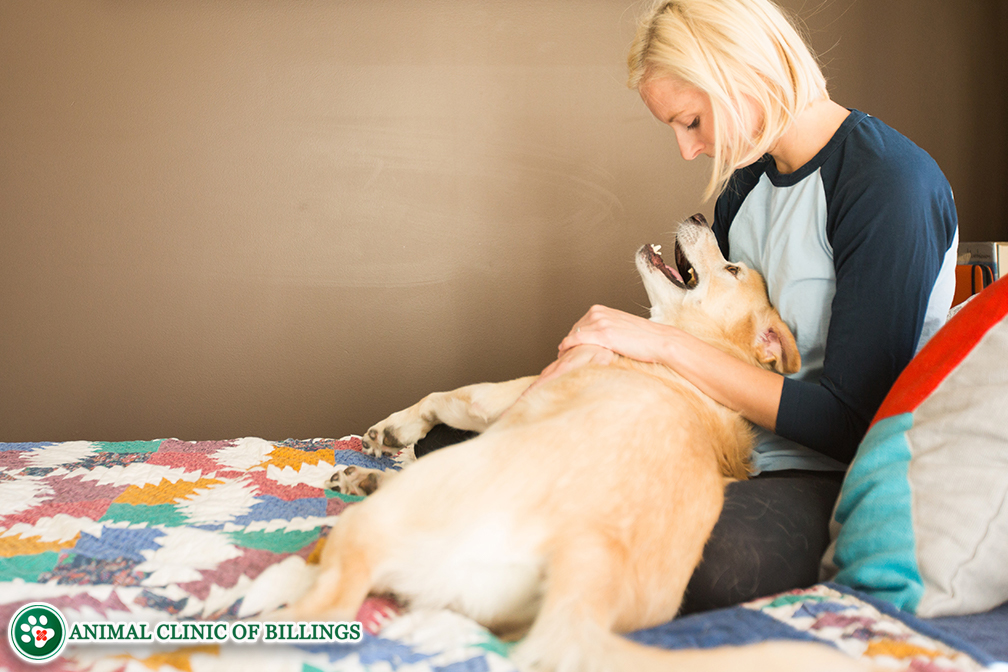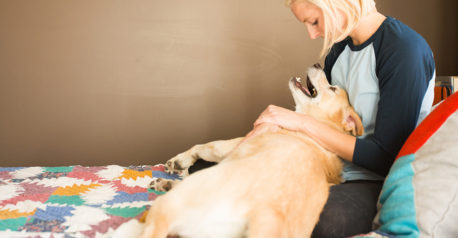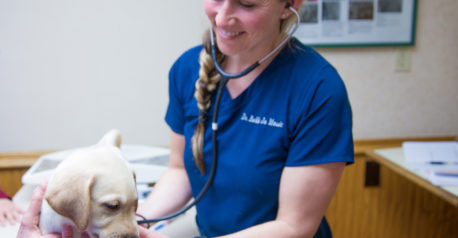Did you know that oral health has a significant impact on your pet’s quality of life, comfort and even lifespan? February is Pet Dental Health Month, and it’s the perfect time to ensure that your loyal companion’s mouth and teeth are in peak condition. After all, your four-legged friend’s overall well-being depends on it!
Expect that your pet will need a professional oral evaluation and prophylaxis every 6-12 months by your veterinarian despite your home care plan.
Warning signs of dental problems in your pet
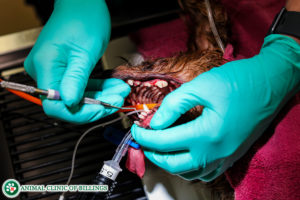
Being a responsible pet parent means doing everything in your power to keep anything harmful from impacting your pet. In a world where many diseases are unfortunately not preventable, it is particularly important to do all we can to avert those diseases that are preventable.
As with most conditions in veterinary medicine, the best and most affordable way to approach a medical problem in a dog or cat is, whenever possible, by preventing them from ever happening in the first place. Our veterinarians want what’s best for you and your dog, and we love to educate clients on preventive measures to keep your dog from developing periodontal or any other dental disease. The key to this is working together and being proactive in maintaining oral health.
The Animal Clinic of Billings and Animal Surgery Clinic’s owner and head veterinarian Ken Brown, DVM has a saying he likes to reference frequently with his clients.
“If it’s predictable, it’s preventable.”
– Dr. Ken Brown, DVM – Animal Clinic of Billings and Animal Surgery Clinic owner, founder and head veterinary orthopedic surgeon
The importance of proper preventive health care initiatives for pets cannot be stressed enough. Dogs that do not receive periodic professional teeth cleanings from a veterinarian are far more likely to develop serious conditions in the future that can quickly end up costing their owner far more than the cost of years of preventive care.
Our veterinarians see examples of this all the time, and it’s why we can’t emphasize enough the importance of preventive veterinary care, especially when it comes to dental examinations and teeth cleaning. If you provide the basic health and maintenance requirements to care for your dog in the short-term properly, it will likely save you money, and potential heartache, in the long-term, as well as help your best friend live the happiest and fullest life they possibly can.
WHAT DO VETERINARIANS LOOK FOR DURING A DENTAL EXAMINATION?
Veterinarians look for disease and signs of abnormality during a dental examination on a dog.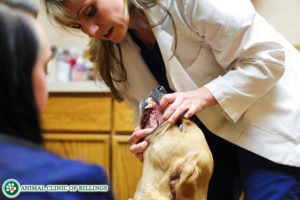 This includes:
This includes:
- Facial swelling
- Cavities
- Tooth abscesses
- Tartar buildup
- Periodontal disease
- Crooked teeth or teeth that interfere with one another
- Gingivitis
- Broken teeth
- Oral masses
At the Animal Clinic of Billings and Animal Surgery Clinic, our veterinarians will develop a customized plan just for your dog to address dental disease prevention, and if needed, dental treatment.
Periodontal disease in cats and dogs
The fact has it that periodontal disease is the most common clinical condition found in adult cats and dogs, and according to the American Veterinary Medical Association (AVMA), 85% of dogs and cats are affected by three years of age!
How does periodontal disease affect cats and dogs?
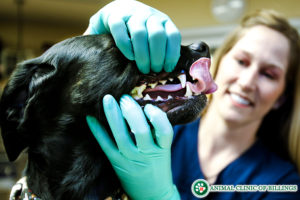
Early detection of periodontal disease is critical because it can develop quickly and result in extensive and potentially irreversible damage to a dog’s teeth, gums, and jaw bone. As periodontal disease reaches an advanced stage, it can cause severe pain and serious health problems that extend well beyond the mouth.
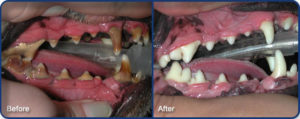
With advancing periodontal disease, potentially dangerous bacteria gain access to the blood supply below the gum line and can seed other tissues throughout the body, potentially causing serious infections in organs such as the heart, lungs, liver, and kidneys, among others. Untreated periodontal disease can also lead to tooth decay, tooth loss, resorption of the jaw bone, and fractures of the jaw.
If periodontal disease is left untreated in dogs, it will undoubtedly lead to infection, the loss of teeth, and a significant amount of pain and suffering for the animal.
Now want the good news? Periodontal disease is entirely preventable!
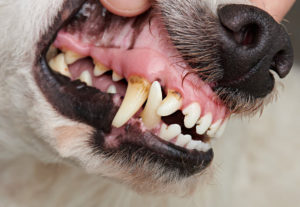
How to prevent periodontal disease in cats and dogs
All you have to do to keep your dog free from pain and the perils of periodontal disease is schedule regular semi-annual dental examinations and teeth cleaning appointments with one of our veterinary dentists at the Animal Clinic of Billings and Animal Surgery Clinic. In maintaining proper oral health and hygiene for your canine companion, you are ensuring they don’t have to suffer in silence the severe pain that accompanies periodontal disease or any of the potential health risks that come with it.
The rules of prevention are basically the same whether the teeth belong to a human or a pet. Dental health initiatives on dogs and cats should be a daily ritual for pet owners.
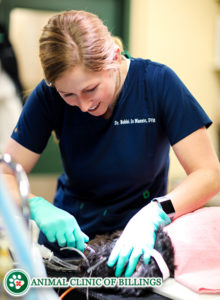
To keep the spread of disease-causing oral bacteria to a minimum, it is important that you establish regular home care involving an oral hygiene routine for your pet that includes:
- Regular veterinary dental exams
- Daily brushing and oral rinses
- Dental treats, health chews and diets
- Use of dentifrices, gels, wipes or water additives
HOW IS PERIODONTAL DISEASE DIAGNOSED?
Periodontal disease is usually difficult for pet owners to detect. Other than bad breath, it’s challenging to pinpoint evidence of its presence without a professional examination by a veterinarian.
Periodontal disease occurs below the gum line and results in bone loss within the jaw. When periodontal disease is suspected or detected by a veterinarian, the dog or cat then needs to be put under general anesthesia to be properly examined. This is the only way a veterinarian can accurately evaluate both the stage and progression of the disease and the best treatment protocol to follow. Typically, dental X-rays are also needed at this time to assess the amount of bone loss and damage that has taken place.
Warning signs of periodontal disease in cats and dogs
Like humans, pets that lack proper oral and dental hygiene can develop illnesses such as gingivitis and periodontitis. If your cat or dog displays symptoms such as foul-smelling breath, pawing at the face or mouth area, difficulty chewing food, reddened gums, tooth discoloration, or it has been more than one year since a regular veterinary checkup, contact your veterinarian.
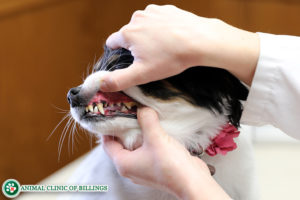 FLIP A LIP!
FLIP A LIP!
Flip your pet’s lips routinely and check the gums and teeth as much as you’re able, especially towards the back of the mouth but never underestimate the importance of regular check-ups with the veterinarian.
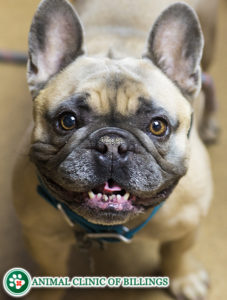 Remember, your pet needs and deserves regular dental care, and that’s why at the Animal Clinic of Billings we offer a free oral exam, so please make sure to have your pet’s mouth checked by a veterinarian at least once a year and get them in sooner if you notice any of the following symptoms:
Remember, your pet needs and deserves regular dental care, and that’s why at the Animal Clinic of Billings we offer a free oral exam, so please make sure to have your pet’s mouth checked by a veterinarian at least once a year and get them in sooner if you notice any of the following symptoms:
- Bad breath
- Broken, discolored, or loose teeth
- Extra teeth, retained baby teeth or misaligned teeth
- Abnormal chewing, excessive drooling, dropping food from the mouth
- Reduced appetite or refusal to eat
- Bleeding, pain or swelling around the face or mouth
- Unexplained irritability or behavioral changes
DENTAL DIETS FOR DOGS AND CATS
What’s the best dog or cat food for pets with dental health problems?
Appropriate nutrition is one of the most critically important aspects of a dog or cat’s health and well-being. Be aware of the foods your pet is eating and ask your veterinarian if the food selection you’re feeding your dog is right for their dietary needs. Diet is an enormous factor in your pet’s dental health, and there are food options available to help dogs combat dental diseases and tartar buildup. High-quality dry food and chew treats fight tartar and plaque better than canned varieties or leftover “people food,” and selecting the best option for your dog or cat’s individualized dental and health needs should be done with the help of your veterinarian.
At the Animal Clinic of Billings, we offer the best Hill’s and Royal Canin varieties of dog and cat food available to help keep your pet as healthy as possible. Ask us about food options, and we’ll recommend what’s best for your dog or cat’s individualized needs.
To prevent plaque and tartar buildup, feed dogs and cats high-quality dry food and chew treats rather than canned varieties or leftover “people food.”
What does it mean if my dog has really bad breath?
When a dog or cat has bad breath, it typically means there is an abundance of harmful bacteria living in and around the animals periodontal tissues, causing chronic infection and disease inside your pet’s mouth. Some people mistakenly believe that bad breath can be normal in some breeds, but this is not the case. The presence of bad breath is never normal or healthy.
Dogs in particular have certainly done their part to contribute to misconceptions regarding the cause of foul-smelling breath through their habits of eating feces and dead carcasses, drinking from the toilet, and orally grooming body parts we consider unsanitary. However, these practices alone are not the sole or even primary source of bad breath. Bad breath in dogs and cats is the result of one thing and one thing only: the presence of progressive dental disease that will continue to get worse without proper dental care.
The only way to solve any progressive dental disease is by a thorough veterinary dental cleaning and implementation of a proper home care dental plan.
WILL MY DOG OR CAT NEED ANESTHESIA FOR A DENTAL CLEANING PROCEDURE?
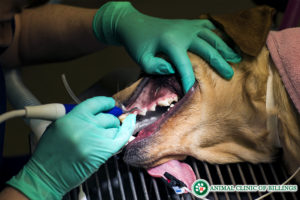 The use of general anesthesia is necessary for our veterinarians to adequately perform dental examinations, dental x-rays, teeth cleanings, tooth extractions, and other dental procedures. Before undergoing anesthesia, a physical exam and pre-anesthesia lab work are performed to evaluate each patient for conditions that may increase anesthetic risk.
The use of general anesthesia is necessary for our veterinarians to adequately perform dental examinations, dental x-rays, teeth cleanings, tooth extractions, and other dental procedures. Before undergoing anesthesia, a physical exam and pre-anesthesia lab work are performed to evaluate each patient for conditions that may increase anesthetic risk.
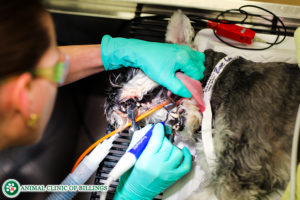
Our anesthesia medications and protocols are the safest and most reliable available, and we continually monitor your dog throughout their entire procedure, and during recovery, until they are awake and alert.
When you go to your dentist, you know and understand that what is being done is meant to help keep you and your mouth healthy, so you accept the procedures and do your best to keep still.
Your dog or cat does not understand the benefit of dental procedures so he or she would likely react by trying to escape, or even bite which may result in injury to themselves, the staff and equipment.
Anesthesia makes it possible to perform the procedure with little stress or pain for your pet and allows for a better cleaning and evaluation, which includes dental radiographs (x-rays) and probing below the gum line. Cosmetic cleanings or “non-anesthetic” cleanings can actually make existing dental disease worse and does not address periodontal disease where it occurs and where scaling is the most important: under the gum line.
Anesthesia during dental surgery on dogs and cats
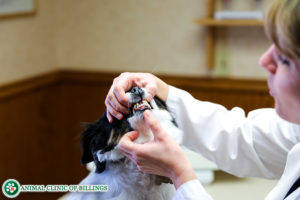
Once a pet is under anesthesia, ultrasonic and hand scaling is performed to remove tartar and plaque buildup above, below, and around the gum line. Thoroughly scaling below the gum line is critical to the success of any dental cleaning in dogs because tarter harboring disease-causing bacteria accumulates in the space between the gum and the tooth.
Polishing the teeth after scaling smooths each tooth’s surface, making it harder for plaque to adhere to your dog’s teeth in the future.
Your dog’s mouth is then vigorously flushed to remove dislodged tartar, plaque and bacteria. If the veterinarian finds a diseased tooth that requires extraction, or if there’s a problem with the gums that need to be addressed, oral surgery will be recommended.
What happens if my dog or cat has a dental disease?
A dental examination at the Animal Clinic of Billings and Animal Surgery Clinic comes as a first step and simply allows one of our veterinarians to peer inside your dog’s mouth to see if any serious dental problems are present. If our veterinarian finds any dental issues in your dog’s mouth, they will then explain to you what they see and recommend the most appropriate treatment plan.
If the diagnosis is severe enough to necessitate dental surgery, your dog will be placed under general anesthesia so the veterinarian can take digital dental X-rays of the jaws and teeth, followed by a thorough examination of your dog’s mouth, including the teeth, gums, tongue, palate, cheeks, throat, and tonsils.
The veterinarian will also probe between the teeth and gums to determine the presence and degree of periodontal attachment loss from infection. All of these steps are important because more than half of each tooth is buried deep beneath the gum line, and often those are the areas most affected by dental diseases. Many times, a tooth may look completely normal to the veterinarian upon the initial examination, but x-rays reveal that the roots are broken or abscessed below the gum line and require treatment.
Unfortunately, in these cases, the dog is most likely suffering from a significant amount of oral pain. If this is the case, and we find a significant dental problem in your dog, you can rest assured that our skilled and experienced veterinarians will make sure your dog walks away from his or her dental procedure completely free of pain and having had their periodontal disease treated as effectively as possible.
ADVANCED ORAL AND DENTAL SURGERY ON DOGS AND CATS
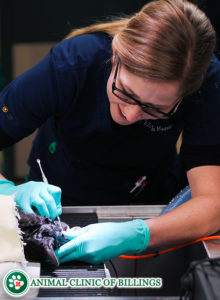
Our veterinarians routinely provide the following oral surgical procedures:
- oral tumor removal and removal of excessive gum
- tooth extractions
- gingival surgery
- tooth sealants
The Animal Clinic of Billings and Animal Surgery Clinic is equipped to precisely perform a variety of oral surgeries so our veterinarians can help your canine or feline companion live a healthy and happy life.
Most pet owners don’t realize how tremendously the quality of dental services vary from one veterinary hospital to another.
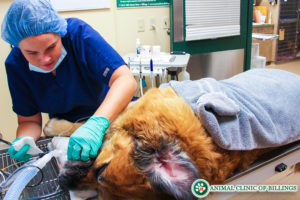
Canine and feline dentistry at the Animal Clinic of Billings and Animal Surgery Clinic has evolved significantly over the years as our veterinary doctors have become more educated and progressive about oral health treatments, and the overall impact that periodontal and other dental diseases can have on the well-being and comfort of our canine and feline patients.
It’s important to remember that because every veterinary clinic or hospital offers a different level or quality of dental care, comparing the price of dental services alone doesn’t reflect the treatment your pet will receive. At the Animal Clinic of Billings and Animal Surgery Clinic, our veterinarians and technicians work to provide the safest and best possible dental care for your dog or cat. One of our highly trained veterinarians oversees and conducts all of our dental surgical procedures, performing tooth extractions and other dental surgery if necessary.
FULL-MOUTH DENTAL X-RAYS
Radiographs, or X-rays, are taken before any dental surgery is performed to ensure the status of everything below the gum line absolutely requires surgical intervention. Studies have proven that less than 50 percent of all dog and cat dental problems and diseases can be identified accurately without dental X-rays. Full-mouth veterinary dental X-rays are especially important for small breed dogs and cats or those types of pets that already have a history of periodontal disease.
ORAL SURGERY AND EXTRACTIONS
After dental X-rays are taken and reviewed by one of our veterinarians, we will provide you with the appropriate recommendations to proceed with if any tooth extractions or oral surgery is needed. All oral surgery procedures and tooth extractions are performed by a veterinarian, and pre-emptive pain control, dental nerve blockers, and systemic pain medication are administered beforehand to ensure your dog or cat remains comfortable and pain-free during surgery and throughout the recovery process.
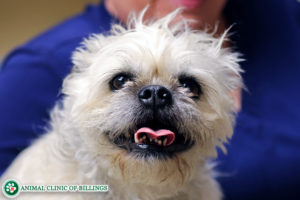
WHAT TO EXPECT AFTER YOUR DOG OR CATS DENTAL SURGERY PROCEDURE
One of our staff members will go over any home care recommendations we have for you to properly maintain your dog or cat’s oral health. In most cases, your pet will remain sedated throughout the evening following a dental surgery procedure, but you can expect them to return to normal behavior the following day. We will likely recommend feeding your dog or cat a soft diet for a few days after undergoing oral surgery. In most cases, your pet will be sent home with pain medication and antibiotics as well.
Remember, routine dental check-ups with the veterinarian are essential for your companion’s well-being. That’s why the Animal Clinic of Billings offers a free oral exam and, if further evaluation or a procedure is needed, we offer a discount incentive year-round to help get your pet the oral care they need and deserve!
Please call and schedule an appointment today!
406-252-9499 REQUEST AN APPOINTMENT


